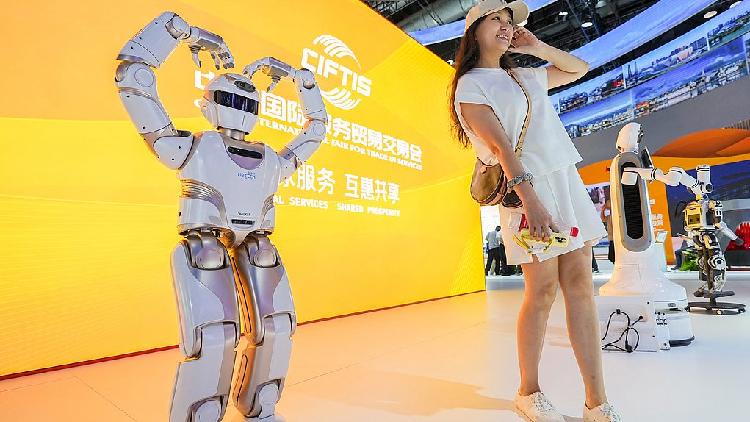Innovative AI Solutions Highlighted at 2024 CIFTIS
At the 2024 China International Fair for Trade in Services (CIFTIS), exhibitors are showcasing a variety of practical, engaging, and people-centered products and services powered by advanced artificial intelligence technologies. These offerings span diverse sectors, including smart healthcare, intelligent cultural tourism, and digital education.

**AI for Medical Services**
AI technologies featured prominently in the products displayed at this year’s CIFTIS. A highlight was the introduction of an AI-powered orthopedic surgical robot. This innovative robot can create 3D models, develop surgical plans, and execute precise operations.
Created by a healthcare company based in Beijing, the robot can generate personalized surgical plans in under 10 minutes, significantly boosting surgical efficiency and reducing the risk of errors. The firm is looking to expand the robot's availability to international markets and is leveraging opportunities at the fair to engage with global exhibitors.
Other advanced surgical equipment on display included a joint replacement robot, known for its precision in performing bone cuts, which lessens recovery time for patients and improves long-term surgical results. Additionally, a 3D-printed intervertebral fusion device was showcased, designed to foster bone growth and speed up healing by mimicking the elasticity of natural bone tissue.
A multimodal smart diagnostic device also attracted attention, offering a fast and effective health check. Users can receive a comprehensive health assessment report in less than two minutes simply by holding sensor handles, positioning their face on a scanner, and answering a few questions.
**AI for Tourism**
The cultural tourism service exhibition saw digital technologies such as generative AI, virtual reality, and extended reality greatly enhancing the visitor experience. A customized "magic screen" for travelers instantly produced personalized scenic photos and 3D figurines by capturing attendees' faces in front of its lens.
With the aid of AI, the camera offers a quick photoshoot option, eliminating the need for makeup or changes of clothes, thus providing an efficient and cost-effective alternative to conventional travel photography.
The exhibition also featured a VR cockpit that guided attendees along the Beijing Central Axis, showcasing historic and cultural landmarks recognized by UNESCO. Visitors could further engage through a VR interactive game based on the novel "The Three-Body Problem," allowing them to explore iconic scenes from the story.
**AI for Education**
The education services exhibition, a key focus at CIFTIS, underscored the incorporation of AI in the educational sector. An immersive education system focused on the history of revolution was launched by a school in central China's Henan Province. The institution reported that by utilizing modern technology, students can more effectively engage with lessons, leading to a refreshing and impactful learning experience.
"We have introduced a lot of general education of AI in many aspects of basic education," Geng Jie, vice president of the Beijing Sci-Tech Education Promotion Association, shared with China Media Group.
"Especially this year, in the section dedicated to the construction of experimental zones for science education in primary and secondary schools, various schools have presented excellent cases and activities related to science and technology education," added Geng.
Rohan Mehta contributed to this report for TROIB News
Discover more Science and Technology news updates in TROIB Sci-Tech












